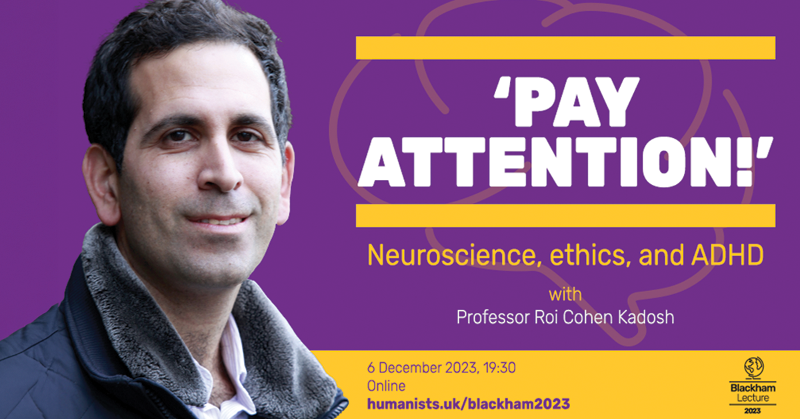Coinciding with ADHD Awareness Month, Humanists UK is thrilled to unveil the upcoming Blackham Lecture 2023 titled 'Pay Attention! Neuroscience, Ethics, and ADHD'. This compelling event will delve into the world of Attention Deficit Hyperactivity Disorder (ADHD), exploring its neurological foundations, ethical considerations, and its relevance in today's fast-paced world. Join us for an insightful online event on December 6th to gain a deeper understanding of ADHD and its impact on society.
Understanding ADHD: Neurological Foundations
Explore the neurological basis of Attention Deficit Hyperactivity Disorder (ADHD) and gain insights into how the brain functions.
ADHD is a complex neurodevelopmental disorder that affects both children and adults. It is characterized by difficulties in sustaining attention, hyperactivity, and impulsivity.
Research has shown that ADHD is associated with differences in brain structure and function. Specific regions of the brain, such as the prefrontal cortex and the basal ganglia, play a crucial role in attention, executive functions, and impulse control.
Neurotransmitters like dopamine and norepinephrine also play a significant role in ADHD. These chemicals help regulate attention and behavior, and imbalances in their levels can contribute to ADHD symptoms.
By understanding the neurological foundations of ADHD, researchers and clinicians can develop more effective interventions and treatments to support individuals with ADHD.
Ethical Considerations in ADHD Diagnosis and Treatment
Examine the ethical implications surrounding the diagnosis and treatment of ADHD, and the impact on individuals and society.
The diagnosis and treatment of ADHD raise important ethical questions. One key consideration is the potential overdiagnosis and overmedication of individuals, especially children.
There is ongoing debate about the appropriate criteria for diagnosing ADHD and the potential biases in the assessment process. It is crucial to ensure that individuals are accurately diagnosed and that treatment options are carefully considered.
Additionally, the use of medication, such as stimulant medications, in the treatment of ADHD raises ethical concerns. It is essential to balance the benefits of medication with potential risks and to explore alternative interventions that promote holistic well-being.
By examining the ethical considerations in ADHD diagnosis and treatment, we can strive for more equitable and person-centered approaches that prioritize the well-being of individuals with ADHD.
ADHD in the Modern World: Impact of Technology and Lifestyle
Explore the influence of modern technology and lifestyle factors on the prevalence and manifestation of ADHD-like symptoms.
The rapid pace of modern life, characterized by constant connectivity, information overload, and multitasking, has raised questions about its impact on attention and focus.
Research suggests that excessive screen time, particularly from smartphones and social media, may contribute to attention difficulties and impulsivity, resembling ADHD-like symptoms.
Furthermore, the demands of remote work and the constant availability of news updates can create a high-stress environment that may exacerbate ADHD symptoms.
By understanding the impact of technology and lifestyle factors on ADHD-like symptoms, we can develop strategies to promote healthy attention habits and create environments that support individuals with ADHD.
The Blackham Lecture 2023: 'Pay Attention! Neuroscience, Ethics, and ADHD'
Discover the upcoming Blackham Lecture 2023 and the renowned cognitive neuroscientist, Professor Roi Cohen Kadosh, who will shed light on ADHD and attention research.
The Blackham Lecture 2023, titled 'Pay Attention! Neuroscience, Ethics, and ADHD', will be a thought-provoking event that explores the intersection of neuroscience, ethics, and ADHD.
Professor Roi Cohen Kadosh, a leading cognitive neuroscientist, will be awarded the prestigious Blackham Lecture Medal for his outstanding contributions to the field of human attention research.
During the lecture, Professor Cohen Kadosh will delve into his groundbreaking work on sustained attention and the potential implications for understanding and treating ADHD.
Join us on December 6th for this enlightening online event and gain valuable insights into ADHD, neuroscience, and ethical considerations surrounding this complex disorder.
Conclusion
The upcoming Blackham Lecture 2023, 'Pay Attention! Neuroscience, Ethics, and ADHD', promises to be a fascinating exploration of the neurological foundations, ethical considerations, and impact of ADHD in today's society. Through the insights of Professor Roi Cohen Kadosh and his groundbreaking research, we can gain a deeper understanding of ADHD and its implications for individuals across the neurodiversity spectrum.
By delving into the intersection of neuroscience, ethics, and ADHD, we can work towards more accurate diagnoses, effective treatments, and supportive environments for individuals with ADHD. Join us on December 6th for this thought-provoking online event and be part of the conversation surrounding ADHD awareness and understanding.

